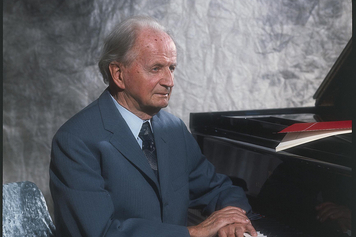Wilhelm Kempff
Sublime simplicity right to the hearts
Top Classical, October 2021
Wilhelm Kempff was born on November 25, 1885 in Juteborg, northeastern Germany, and spent his childhood in Potsdam, before entering the Berlin Conservatory. His father was the royal music director and organist of St. Nicholas Church, his grandfather was also an organist, and his brother later became the music director of a church. Kempf was encouraged by his father to learn piano and entered the Berlin School of Music at the age of nine with the teachers Karl Heinrich Barth and later Robert Kahn.
From 1918 he began his career as a soloist, and by 1934 he had become one of the best specialists in Bach and Beethoven. After World War II, Kempff, was in the “black list” by the Americans because he had not chosen exile with the arrival of the Nazis, and had to wait until 1964 to restart his concerts. On this date he had a triumphant performance at Carnegie Hall in New York, and the following year, a memorable concert at Lincoln Center, under the direction of Leonard Bernstein. He received the Mendelssohn Prize in Berlin for piano performance and composition in 1917, including Beethoven’s “Sonata Hammark Claver” and Brahms’s “Paganini Variations”, which quickly became famous in Europe and internationally. In 1918 he collaborated for the first time with the Berlin Philharmonic and served as conductor of the Stuttgart School of Music in Germany from 1924 to 29. Between 1936 and 1979, he held 10 concerts in Japan. He made his first appearance in London and New York in 1951 and 1964, respectively, and made his last public performance in Paris in 1981. He retired due to health problems (Parkinson’s disease).
Everyone who had been lucky enough to listen he live performances of this great German pianist, probably had the feeling of being in a “temple” more than in a concert hall. Kempff knew how to convey a very deep, even “religious” meaning to each of the works he performed. During his performances, Kempff himself and even the audience “disappeared,”. Under his privileged hands during that time only Beethoven, Brahms or Schubert existed.

The composers and the works interpreted were for him the only reason of existence. However, and paradoxically, the quality of the works and the high musical sense he projected were probably the strongest link a performer could have with the audience. Mozart, Beethoven, Schumann and Brahms sharpened everyone’s sensitivity when performed by the maestro.
Kempff has recorded more than once the 32 Beethoven sonatas and the 5 concerts for piano and orchestra. Although his characteristic personality and full technical mastery of this artists contributed to the excellence of his performances, his solid cultural and humanistic training also played an important role, since he had university degrees in philosophy and history of music.
Inexplicably, there isn’t much being said about this outstanding artist who, with his maestry and life devoted to music, left us with some of the most brilliant music interpretations and compositions of the history. We hope that his artistry will be better recognized with time.
